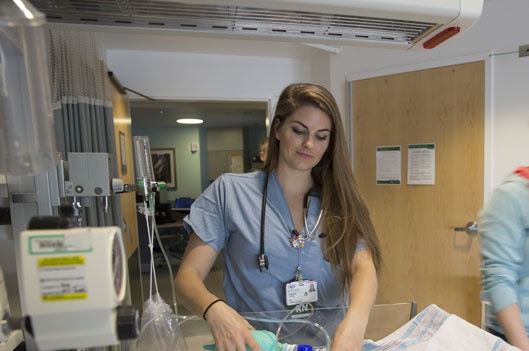Nurses explain why they love specializing in childbirth
Labor and delivery nurses enjoy the privilege of helping patients through one of the most profound and vulnerable experiences of their lives.
Now a nurse in the Rush Family Birth Center, Sharon O'Brien, MSN, RN, knew she wanted to specialize in this area the first time she stepped into a labor and delivery unit.
"The energy was captivating," she remembers. "The waves of calm followed by surges of chaos and emergency are what made me fall in love with labor and delivery. There are moments of extreme stress and tension, followed by moments of pure joy."
Labor and delivery nurses spend their shifts working hard to protect the safety of mothers and infants. They manage a range of responsibilities, from monitoring fetal heart rates, managing pain and offering labor support to addressing high-risk situations and providing postpartum care, usually for multiple patients at a time.
An ER, an OR and a recovery area
No two days, patients or situations are ever the same, according to Rush University College of Nursing GEM program graduate Amy Lang, MSN, RNC-OB. (GEM is the college's Generalist Entry Master's program for non-nurses.) “The fast pace of labor and delivery with a rewarding outcome can be refreshing," she says.
As with all nursing specialties, labor and delivery involves working as part of a team to provide the best possible patient care. However, the specialty also offers inherent benefits and challenges all its own.
"It's a very specialized field that requires nurses to know about other medical/surgical conditions that can affect a patient's labor and delivery experience," says O'Brien, who also earned her master’s degree at Rush. "The labor and delivery unit at Rush functions as an emergency department/triage area, an operating room and a post-anesthesia recovery area."
"You're always dealing with someone in immense amounts of pain who needs support," she says. "As a nurse, you get them through the labor, coach them through delivery and then teach them how to care for their baby."
Personal connection in joy and grief
The job of a labor and delivery nurse can be personally and professionally satisfying, but, as Lang points out, it also requires a unique kind of compassion in the event things go wrong.
"It's an incredible honor to be part of new life, but it's not all about holding and rocking babies," Lang says. "You also help in times of struggle. This time can be rewarding as well — helping families grieve in times of loss."
"I'm really able to connect with patients," Lang adds. "I haven't had children of my own, but I can relate to them, being a woman who wants to be a mother someday."

